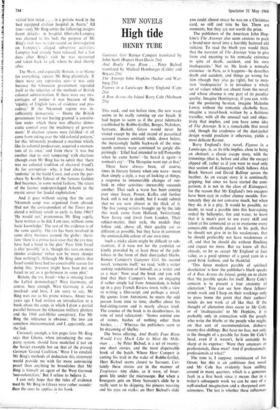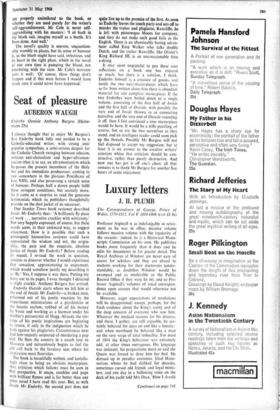NEW NOVELS
High tide
HENRY TUBE
And Really Frau Blinn . . . Peter Bichsel translated by Michael Hamburger (Calder and Boyars 25s) The Attempt John Hopkins (Seeker and. War- burg 25s) Figures in a Landscape Barry England (Cape 21s) A Run Across the Island Barry Cole (Methuen 25s) This week, and not before time, the new wave seems to be really running up our beach. It had begun to seem as if the great tidemarks established by Robbe-Grillet, Borges, Nabokov, Sarraute, Beckett, Grass would never be visited except by the odd strand of parasitical seaweed (names omitted) while, down below, the increasingly feeble backwash of the nine- teenth century wave continued to gurgle dis- piritingly: 'Ethel had intended to tell Ponsonby when he came home'—'he heard it again—a woman's cry'—'The Marquise went out at five.'
There have always been, of course, times in literary history when one wave—more than simply a style, a way of looking at things, a response to innumerable changes of out- look in other activities—inexorably succeeds another. That such a wave has been coming ever since Joyce, Proust, Kafka and further back still is not in doubt, but I would submit that we are now almost in the thick of it. The five young writers brought up by the tide this week come from Holland, Switzerland, New Jersey and (two) from London. Their subject-matter, their style, the models they follow and, above all, their quality are as different as possible, but they have in common the unmistakable colour of our own time.
Such a tricky claim might be difficult to sub- stantiate, if it were not for the yardstick so kindly provided by at least three of the pub- lishers in the form of their dust-jacket blurbs. Remco Campert's Gangster Girl, his second novel, 'concerns itself,' we read, 'with a writer seeking redefinition of himself, as a writer and as a man.' Now read the book and you will find that Herr Campert's hero, an engaging if rather simple lad from Amsterdam, is holed up in a grey French Riviera town, with a view to writing a film-script and perhaps a novel. He quotes from Antonioni, he meets the odd person from time to time, shuffles about his bed-sitting-room and is nearly always tired. The essence of the book is its desultoriness, its tone of total relaxation: 'Stones remind one of stones, bushes of nothing other than bushes. . . .' Whereas the publishers seem to be dreaming of Shelley.
The Swiss offering, And Really Frau Blum Would Very Much Like to Meet the Milk- man . . . by Peter Bichsel, is a set of twenty- one short stories, and the most dispensable book of the batch. Where Herr Campert is cutting his trail in the wake of Robbe-Grillet, Herr Bichsel seems closest to Sarraute. Cer- tainly these stories are in the manner of Tropismes—tiny slides, as it were, of bour- geois life under the microscope. But when a bourgeois gets on Mme Sarraute's slide he is really seen to be skipping, his pincers weaving and his eyes on stalks; on Herr Bichsel's slide you could almost swear he was on a Christmas card, so still and trite he lies. There are moments, but they are not worth the price.
The publishers of the American John Hop- kins's The Attempt also seem anxious to pack a brand-new novel into a horribly battered old suitcase. To read the blurb you would think that the narrator of The Attempt 'tries to give form and meaning to his nomadic existence in spite of death, accident, and his own inadequacies.' Not so. He leads a nomadic existence--in Peru, as it happens—he describes death and accident, and things go wrong for him (though they also go right), but to men, tion 'inadequacies' is to introduce a whole set of values which are absent from the novel, and whose absence is one part of its peculiar quality. Imagine Hemingway, if you can, with- out the posturing he-man, imagine Malcolm Lowry without the romantic alcoholic haze, imagine a travel-book written by a fictitious traveller, with all the unusual tact and objec- tivity that implies, and you have some idea of The Attempt. It is a remarkable fi'rst novel and, though the crudeness of the dust-jacket design would proclaim it otherwise, yields a most delicate flavour.
Barry England's first novel, Figures in a Landscape, is, as its title implies, close to being an abstract; a classic escape story, with the trimmings (that is, before and after the escape) clipped off, rather as if you were to read only that section of Kidnapped which follows Alan Breck Stewart and David Balfour across the heather. As an escape story it is continually gripping, but since we have started the com- parison, it is not in the class of Kidnapped, for the reason that Mr England's two escapers have been cast in rather clumsy moulds. For- tunately they do not converse much, but when they do, it is a pity. It would be possible, no doubt, to read a parable into this hair-raising ordeal by helicopter, fire and water, to learn that it is man's part to use every skill and talent at his command so as to overcome every conceivable obstacle placed in his path, that he should not give in to his weaknesses, that he should preferably not have weaknesses at all, and that he should die without flinching and expect no more. But we know all that already, so let us accept Mr England at face value, as a good spinner of a good yarn in a good brisk fashion, and be thankful.
`This fierce modern parable of spiritual dereliction' is how the publisher's blurb speaks of A Run Across the Island, going on to claim that 'the parable speaks for itself. Barry Cole's concern is to present a true anatomy of alienation.' You can see how these fellows' minds work and I harp on their workings only to press home the point that their authors' minds do not work at all like that. If the thought of alienation does occur to Mr Cole, or of 'inadequacies' to Mr Hopkins, it is probably only in connection with the people who write the blurbs or the people who might, on that sort of recommendation, disburse twenty-five shillings. But have no fear, not only is the thought of a parable far from Mr Cole's head, even if it weren't, he'd certainly be sharp at its expense: `Were they amateurs or professionals, these men? And if professionals. professionals at what?'
The tone is, I suppose. reminiscent of Joe Orton; but this is an ambitious first novel and Mr Cole has evidently been sniffing around in many quarters, which is a generous fault in a first book since it means that in a writer's subsequent work we can be sure of a well-stocked imagination and a sharpened con- sciousness. The test is whether these influences are properly assimilated to the book, or whether they are used purely for the writer's self-aggrandisement. Mr Cole is never self- aggrandising with his masters: 'I sit back in my black suit, imagine myself as a beetle. It's been done. And well.'
The novel's quality is uneven, unquestion- ably wambly in places, but its sense of humour is, as the blurb might have said, infectious, and its heart in the right place, which in the novel of our own time is pumping the blood, not interfering with the view. Mr Cole's narrator puts it well: 'Of course, these things don't happen and if this were fiction I would have made sure it could never have happened.'







































 Previous page
Previous page